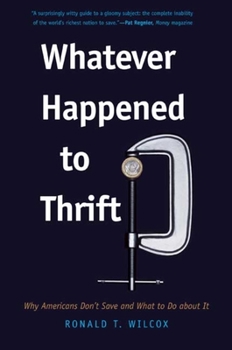Whatever Happened to Thrift?: Why Americans Don't Save and What to Do about It
Select Format
Select Condition 
Book Overview
Not saving is more than just a problem that affects individual Americans and their families--it's a national problem In this thoroughly researched and thought-provoking book, Ronald T. Wilcox clearly describes...
Format:Paperback
Language:English
ISBN:0300158246
ISBN13:9780300158243
Release Date:June 2009
Publisher:Yale University Press
Length:176 Pages
Weight:0.95 lbs.
Dimensions:0.5" x 6.1" x 9.1"
Customer Reviews
5 ratings
A fantastic read! Helps one understand how we view saving - and what can be done to encourage wise
Published by Thriftbooks.com User , 14 years ago
I love this book! It talks about American attitudes about saving, and how things have changed over the years - and probably why. It also talks about saving in other lands, and what would probably be very wise to do in the U.S. - how to encourage wise savings habits, how to get "poorer" people to save - this book should be a must read, as well as several other books, in junior high, high schools, colleges, workshops in the workplace, etc - It is very interesting to read books written a few years ago, like this one - before the government created the mortgage crisis, and went head-over-heals into debt over the "stimulus" and other matters.
timely and critical to future of US
Published by Thriftbooks.com User , 16 years ago
If you are interested in your financial future and the economy of the US and the world, this is a great starting place. Unfortunately, it wasn't written 10 years ago so the average Joe could have understood the "folly of ways" for many of us.
A textbook version of this work should be required reading in every High School
Published by Thriftbooks.com User , 16 years ago
The professor identifies the many complex reasons why Americans don't save enough in the first half of the book. In the second half he provides practical solutions. If they were all implemented it hard to believe that Americans over time would not become more thrifty. Professor Wilcox is pessimistic about the difficulties of changing American culture. But perhaps this deep and long once-in-a-hundred-year recession (in not depression) caused by excessive spending on housing will give thrift an opening and allow it to creep into the culture. That might be the only positive thing that comes out of this disaster. Recently there were record declines in retail sales. A clear sign that thrift, driven by fear, is getting a foot-hold, at least in the short run. The author struck just the right balance. Not too technical. Not too simple.
Great fusion of psychology, economics, finance and public policy
Published by Thriftbooks.com User , 16 years ago
This book really opened my eyes to the importance of saving. This was the first time I really grasped how individuals' lack of savings can adversely affect the nation as a whole. Wilcox's style is entertaining, and he always illustrates concepts with an interesting example or personal story. More important, Wilcox made me realize the tricks I've been playing on myself that can sabotage my financial future. I'll never think about money the same way again. This is a perfect book for anyone who's concerned about the savings crisis or wants to save more and make better investment choices. Parents should buy it for their children who are in college, recently employed or starting a family - and then read it themselves. This book is a wealth of information for people at all stages of life. This is NOT the same old personal finance advice you've heard before. Wilcox's advice is uniquely tailored because he draws from research in many fields (psychology, economics, finance, etc.) to give readers useful information about one topic - how to save more money.
A Surprisingly Engaging Read
Published by Thriftbooks.com User , 16 years ago
This is not the type of book I typically read. However, once I started reading it I found the writing style engaging and the book well organized. At a time when the government is sending all Americans generous stimulus checks along with instructions to "spend, spend, spend" Wilcox points out the importance of savings at both a national and a personal level. According to the author, the widening income gap between the very wealthy and everyone else is a contributing factor to the historically low levels of savings in America. Wilcox goes on to talk about various policies that both governmental and corporate leaders can adopt to encourage savings. While Some of these policies such as a consumption tax and a partial privatization of social security suggest a conservative agenda, the book reads more as a common-sense analysis than a political screed. Wilcox's writing style makes subject matter that would ordinarily be both depressing and dry very readable. I found it an entertaining, if depressing, read that made me personally insecure in my savings and will hopefully have the same affect on our nation's leaders.





